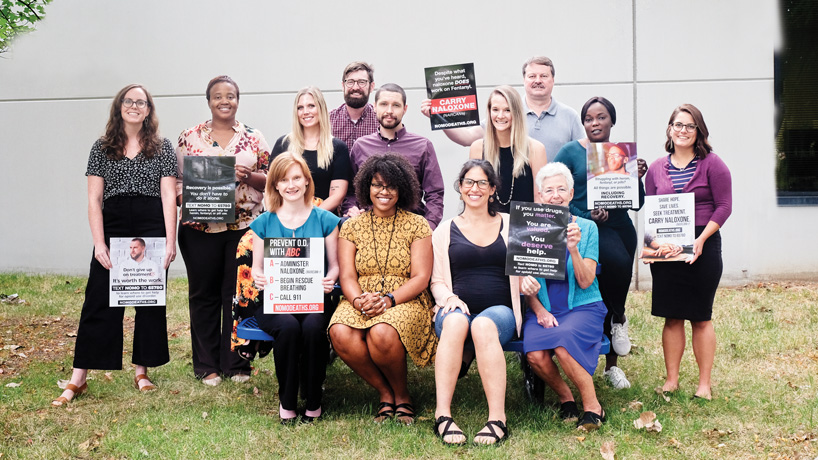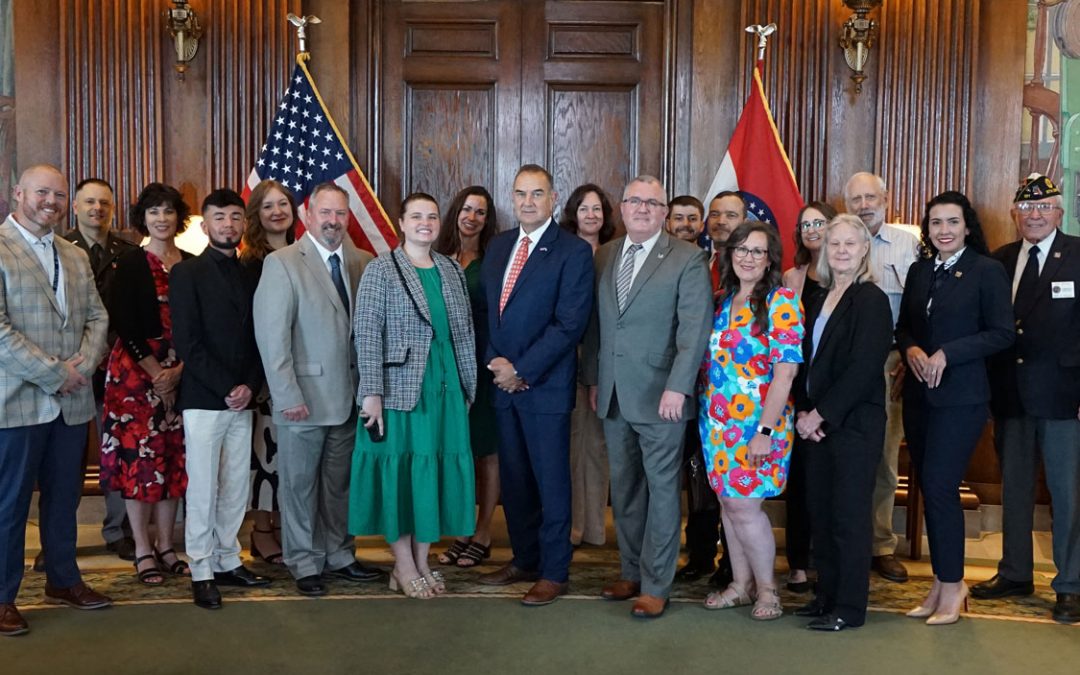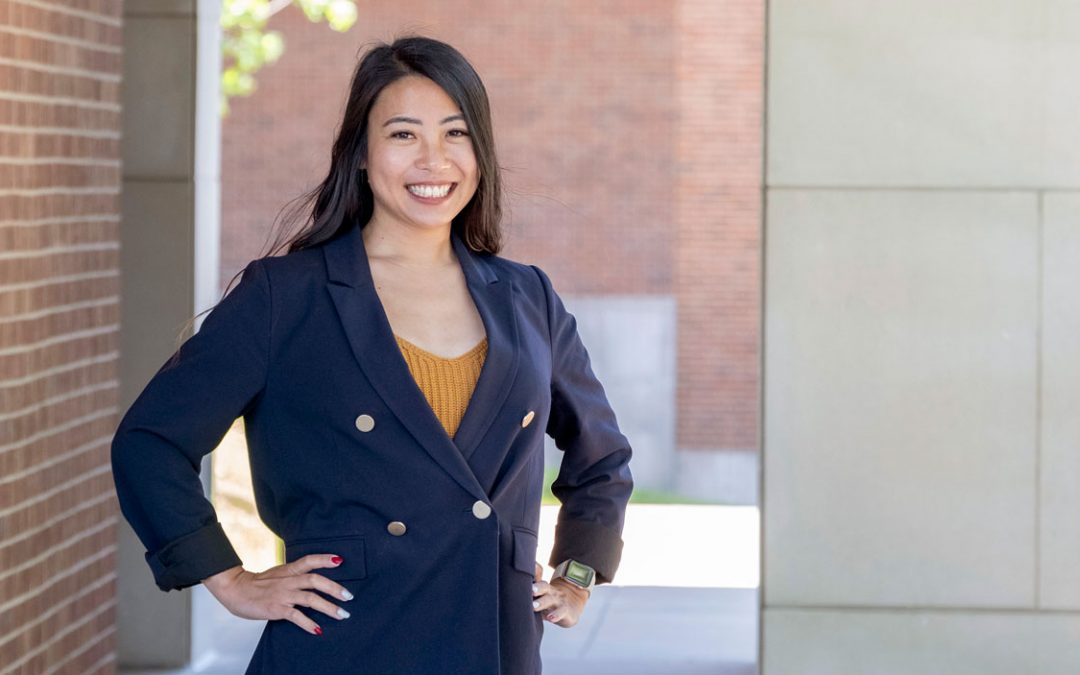
The Missouri Institute of Mental Health’s addiction science team, led by Associate Research Professor Rachel Winograd (front row, second from right), will receive more than $2.75 million in federal funding to combat the overdose crisis. (Photo by August Jennewein)
The addiction crisis continues to rage throughout the United States, including in Missouri, frustrating community health-care workers and researchers trying to gain control of the problem.
University of Missouri–St. Louis Associate Research Professor Rachel Winograd knows that frustration too well as the director of the Missouri Opioid State Targeted Response and State Opioid Response grants. Since 2017, she’s co-led efforts by the Missouri Department of Mental Health and its partners to implement an evidence-based approach to deal with the crisis. It relies on the use of medications such as buprenorphine and methadone to help people overcome addiction and naloxone to reduce the instances of overdose.
“You do see that the tide has turned in a lot of key stakeholder groups when it comes to attitudes toward medication and harm reduction,” said Winograd, who leads the addiction science team at the Missouri Institute of Mental Health. “That needs to continue and that needs to expand, and it’s going to take a long time. But attitudes are just one piece of the puzzle.”
More challenges remain, but a new round of funding is helping Winograd and her colleagues broaden the scope of their efforts and engage new partners in the fight.
Missouri is receiving $25 million in funding from the Substance Abuse and Mental Health Services Administration in each of the next two years with $2.95 million annually earmarked to go to the University of Missouri System.
That includes $2,755,589 to UMSL, much of it to be used to obtain doses of naloxone and hire the people required to deliver it to the communities where it’s most needed.
If that represents a continuation of ongoing efforts that started in 2017, the new funding is also allowing for an added focus addressing stimulant use, most notably methamphetamine and cocaine.
“These are not strictly opioid grants anymore, which is good because most people who use opioids don’t only use opioids,” Winograd said. “This is a poly drug overdose crisis, not just an opioid overdose crisis.
“Whether it’s funding for actual treatment of stimulant use disorder through the state or prevention and awareness initiatives, more harm reduction strategies in education, we’re encompassing stimulant use disorder into our training and service efforts intentionally.”
In hopes of improving prevention, they’re partnering with Big Brothers Big Sisters of Eastern Missouri for the first time, both in the St. Louis metro area and in the Cape Girardeau area, to focus on youth development and mentorship with a particular focus on African American youth.
They’ve also added a partnership with local nonprofit The T, a health education and resource center located on Delmar Boulevard and focused on violence prevention, homeless outreach and COVID response. The organization is adding resources for substance use and addiction to its holistic suite of services.
Some funding will also support expansion of the Behavioral Health Network of Greater St. Louis’ EPICC project – Engaging Patients in Care Coordination – that connects people who have recently survived an overdose to treatment and recovery resources. The project connects them to peer specialists who provide support as they begin their journey.
The project is increasing its outreach in north St. Louis and working with churches in high-need zip codes to become hubs for resources and access to care. The hope is eventually they will host support groups there and provide access to telemedicine, so people don’t need to travel to a treatment center or have their own technology devices to get the support they need.
“I think every time we’ve worked with the Department of Mental Health to add something, it’s been to bring on a new partner closer to the ground than we are,” Winograd said.
She and her team are working with the EPICC project to launch a pilot to study the effectiveness of telemedicine inductions on buprenorphine, which takes advantage of an ease in federal regulations in response to COVID. Previously, patients would need to make an in-person visit to receive a prescription for medication to treat substance use disorder, and that has been a barrier to beginning treatment.
Winograd knows more is needed because so much about addiction is tied to the broader societal issues.
“I still believe in the evidence-based solutions that we’ve been proposing from the get-go,” Winograd said. “But we need those things and we need housing, we need transportation, we need food, we need health care, we need childcare.”
The COVID-19 pandemic has only increased the challenge for those trying to end the drug crisis.
It has also disrupted the drug supply and made it more volatile and unpredictable. When people can’t be sure what they’re buying and using, it can lead to greater chaos and more death.
The pandemic also has increased the stress and feelings of anxiety that can lead people to begin using drugs, and it has created barriers for people seeking treatment, perhaps because of budgetary cuts and reduced hours at facilities where people might seek help.
“People are getting left behind, and it’s not any specific entity’s fault,” Winograd said. “It’s just the reality of how our society is structured and our society’s response to this pandemic.”














